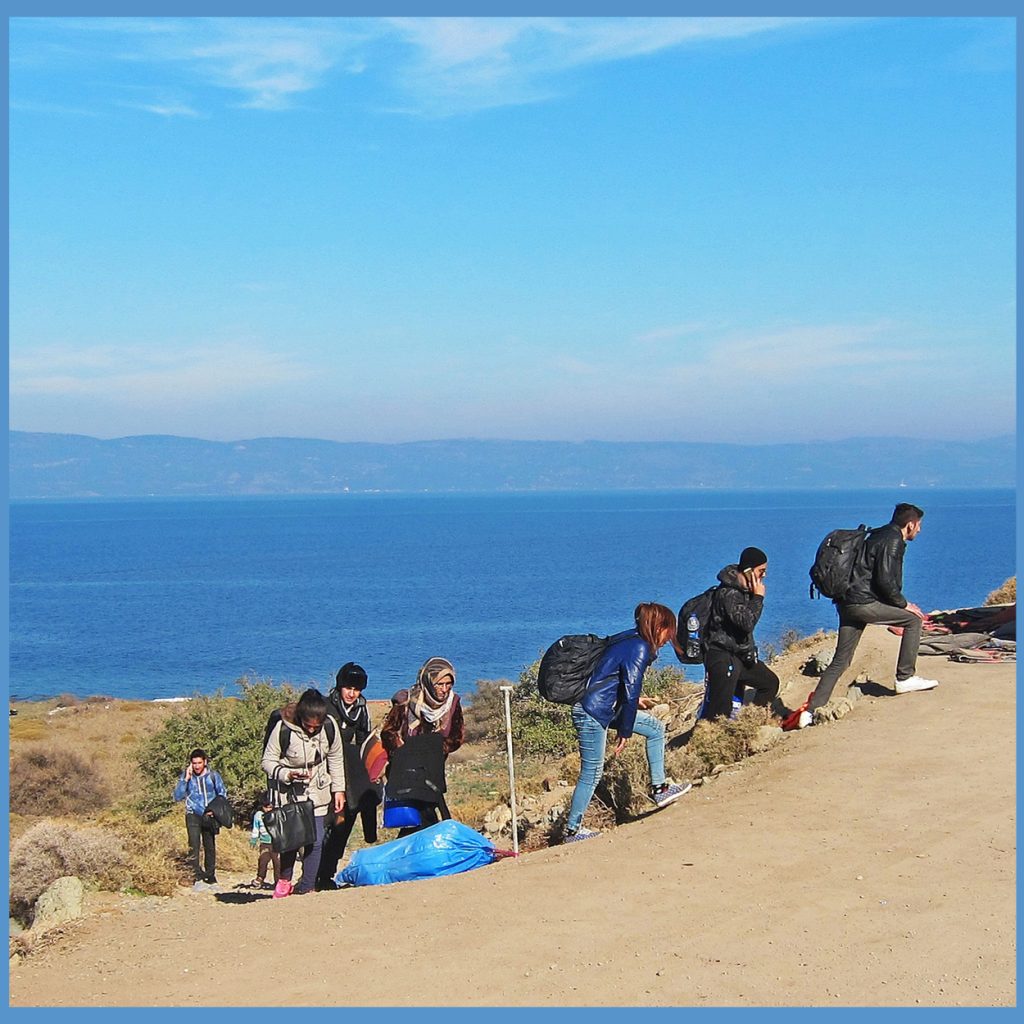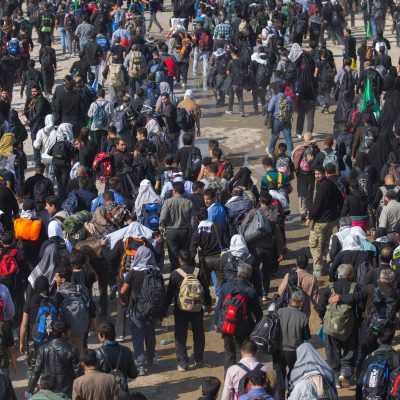The health crisis should not eclipse the migration crisis

In the last month, a dramatic timeline has seen an overlap of the migration crisis and the health crisis. Media coverage focused on Covid-19 appears to have smothered the migration issue. Yet in practice, our crises and the way in which we respond to them are linked. Solidarity brings about multiplier effects: the more we express this among ourselves, the more we are able to experience it with others, and vice versa.
Let us start by looking back at the chain of events. In January, the coronavirus crisis in Asia extended to Europe. From February, Italy, then France, Spain and soon after the European Union in its entirety were hit by the epidemic as it also reached the Americas. As lockdown measures became widespread, the Turkish president, Recep Tayyip Erdogan, failing in his offensive in North-East Syria, established on 29 February a form of migration blackmail on the border with Greece. This cynical behaviour is very meaningful. The strategy is not only to obtain diplomatic back-up against the Syrian regime and its allies, but also to flag the risk incurred by Ankara of a new exodus of refugees from the Idlib area, at a time when Turkey is one of the top host countries in the world with 4 million refugees.
By only wanting to see the blackmail aspect of this dramatic event, the European Union had to reveal the precariousness of its common asylum policy, which is at the mercy of Turkey. The successive trips made by EU leaders to the Evros river border and to the Greek, Bulgarian and Cypriot capitals shows their solidarity with the countries whose borders are potentially under threat. At the same time, these trips condone actions unacceptable according to the EU’s fundamental values: the suspension of access to asylum rights by the Greek government and above all the disgraceful situation for applicants of refugee status in the Greek islands that has gone on for months. Civil society’s indignation is at its peak, and rightly so. Representatives of the High Commission for Refugees (HCR) in Greece and in Turkey expressed their disapproval with discretion.
Dramatic scenes, which received broad media coverage, will stay in our minds: clashes between migrants and Greek police officers supported by makeshift local militiae, boats pushed back out to sea by the coastguards, and probably the most terrible, the insults and assaults experienced by humanitarian workers in Noria, on the Greek island of Lesbos, from the exasperated local population. The latest is that tensions have been calmed. Turkey, itself under lockdown, has closed its borders and repatriated to Istanbul the poor Afghans and Pakistanis enlisted in this power struggle.
There is still much discomfort, however, including among European leaders. A €700-million aid programme for Greece was decided in an emergency procedure by the Council, which should contribute significantly to increasing the quality and quantity of migrant hosting capacities not only in the Greek islands but also on the mainland. In approving this exceptional assistance programme for Greece, European Heads of State and Government have thanked the country for “having defended the EU border on its own borders”.
It could not be better expressed that these mistakes and emergencies are our own. The most significant emergency urges us to join the warning message from the European Commissioner for Home Affairs, Ylva Johansson, who is most directly in charge of implementing the European asylum policy. In early April, she warned against the epidemiological risk in camps in the Greek islands, where around 40,000 people are herded together in degrading conditions. Covid-19 has brought European negligence to the fore from a humanitarian standpoint. The aforementioned emergency aid programme should be rounded off by large-scale emergency humanitarian intervention, coordinated on a European level and mobilising the EU’s resources for its external humanitarian interventions. Above all, the most vulnerable to the risks of poor treatment, in particular unaccompanied minors, should be removed without delay from the overcrowded camps. A very small number of countries have answered the call from Germany to accept around 1 600 unaccompanied minors from the Greek islands. The list has not been clearly established as good intentions are waning as time goes by. The extent to which the EU’s very honour is at stake must be stressed here, with the importance it gives to the principle of solidarity, while Greece clearly cannot bear this burden alone.
Yet, beyond this humanitarian emergency, another, deeper, reality is striking: Schengen, Dublin, Ankara. Since March 2016, the mechanisms governing free movement within the European Union (Schengen Area) and the distribution of the asylum application burden (Dublin Rules) form a system with a migration agreement (with Ankara) which delegates to Turkey a major proportion of the hosting of refugees intending to travel to the EU, in particular Syrian asylum applicants. In 2015, Turkey hosted 2.5 million refugees and figures are now reaching 3.6 million in 2020. At the same time, the influx of asylum seekers towards the EU declined considerably between 2017 and 2019, to the extent that EU leaders, and particularly European ministers for home affairs (JHA Council) stated that “the migration crisis is now behind us”. This is an abhorrent example of the collective short-sightedness in our leaders’ judgement as they want to reassure public opinion at all costs.
In 2016, faced with the obvious failure of the Dublin rules, unable to ensure a fair and stable distribution of asylum seekers to be hosted in the European Union, it may have appeared pragmatic to seek an outcome with Turkey. The EU-Turkey Statement of March 2016, which cemented this agreement, was subject to fierce criticism from civil society and professional asylum stakeholders. It includes a clause to resettle Syrian applicants due to the questionable classification of Turkey as a “safe country”. In practice, this clause was not applied. In addition, Ankara quite honourably discharged this hosting responsibility and even received acknowledgement from the HCR during several international meetings. European assistance for refugees hosted by Turkey implemented at this time (around €1.5 billion per year, of which €0.6 billion for humanitarian aid) has given rise to the largest humanitarian aid programme ever launched by the EU, ensuring a form of minimum subsistence for around 1.7 million people.
Nevertheless, this type of assistance provided by Turkey to Europe has not been leveraged to remedy the deep-rooted inconsistencies of the Dublin rules, the cornerstone of the European common asylum system, which are absolutely essential for the proper functioning of the Schengen Area. As President Erdogan was issuing his ultimatum, the JHA Council was displaying its inability to agree on a way forward proposed by Germany, including a renouncement of the principle of country of first entry. As a result of this, the new EU Pact on migration and asylum announced by the Commission, intended to break the gridlock, is still pending.
This situation is no longer tenable. Sustained or manipulated, the instability of migration in Turkey puts the EU in a situation of great vulnerability. Even the disorderly re-establishment of internal borders would not prevent an exodus towards the central EU Member States. This prospect on top of the humanitarian emergency requires the EU to “finally take the bull by the horns”. Given the link that now exists between the European Union and Turkey for the asylum issue, political progress is required on two fronts.
The negotiations currently taking place with Turkey to overhaul the agreement signed in the spring of 2016 must be an opportunity to organise in a robust manner the sharing of hosting responsibilities between Turkey and the EU. The EU must better acknowledge the effort made by Turkey to host refugees mainly but not only from Syria, without ruling out an assessment of asylum applications which will continue in any event to be submitted to the EU via Turkey. This will most likely involve upwardly revising the amounts of European facilities on the grounds of Turkish hospitality of migrants. It is also important to stress that the amounts spent on this by the EU in aid of the refugees hosted by Turkey are disproportionate to the expenditure incurred by EU Member States to host asylum seekers in their countries. Above all, the EU-Turkey Statement must now be placed under the auspices of the Global Compact on Refugees adopted on 17 December 2018 by the United Nations. It would then be considered as a “regional agreement” drawing on the Comprehensive Plan of Action Framework for Refugees. In addition, this would have the advantage of placing the EU and Turkey in a framework of multilateral rule of law which would facilitate dispute resolution. Against this backdrop, Turkey could be a hub for the application of the European resettlement policy, supported by the HCR. It is possible that other transit and host countries could in future sign similar agreements with the EU as part of the multilateral framework of the United Nations Compact for Refugees.
At the same time, building on the need to provide essential assistance to Greece for the care of the 40,000 people trapped on the islands in the Aegean Sea, it is necessary to agree once and for all on a genuine system to share responsibility for asylum applications drawing inspiration today from Germany and as of 2016 from the European Parliament, intended to foster long-term solidarity between Member States, albeit, as proposed by the Jacques Delors Institute, at the expense of a differentiated approach.
Jacques Delors recently reminded that a lack of solidarity in the crisis currently hitting the EU could be fatal. This is also the case for the critical issue of asylum.




